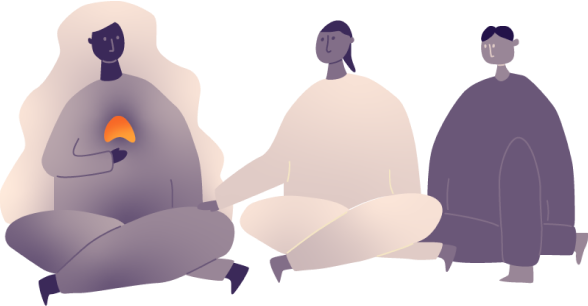Awhi is still in development, we'd love your feedback and suggestions. Let us know.
How do I help my disabled child with their anger?
Most parents know what it’s like to have their toddler struggle in a supermarket aisle or a busy parking lot, but they know that their child will grow out of these meltdowns as they understand their sensory needs.
This doesn’t always happen for children who are disabled or neurodivergent as they often struggle to understand the world around them. Anger and frustration can be their logical response to this. Even if, as a parent, you work hard to eliminate causes of frustration, it is inevitable that your child will still occasionally act in ways that upset and challenge you. Your child needs to know it is okay to feel angry sometimes and that you’re on their side, no matter how spectacular their outburst may have been.
Your child’s anger and how they cope with that anger is not a reflection of your parenting abilities. It is understandable if you feel stressed, embarrassed, or angry. If this is the case, don’t bottle it up. Talk to your partner, your family, a friend, or someone you trust about how you’re feeling. You are your child’s most important advocate, so it’s important for you to take care of yourself as much as you can.
Before we dive into the literature on child anger, it is important to know that experts don’t always agree on anger management strategies, which can be confusing for those trying to find answers. However, a crucial distinction is that meltdowns are a behaviour, which all children are capable of. So, while your child may be having what others call a “temper tantrum”, they may also be experiencing an overload of stress.
Neurodivergent children especially, tend to suffer from cognitive or sensory overload and have what are commonly known as meltdowns. The recommended ways of dealing with meltdowns are _not** **_the same as for other angry outbursts.
Top tips for parents on dealing with your child’s anger:
- Build coping skills: Focus on responding to your child’s difficult behaviour in a way that helps them learn some useful coping skills. Try not to see the behaviour as naughty or attention-seeking.
- Keep expectations and goals realistic: Have realistic goals for what your child can cope with, to avoid sensory overload.
- Consistency is key: It works best when everyone in your child’s life takes the same consistent, calm approach to dealing with anger.
- Understand it’s complex: Imagine their angry behaviour is like the tip of an iceberg. You see what’s above the surface, but the reason for their behaviour is hidden below the water.
- Stay calm: Communicate calmly and clearly with your child. Don’t meet anger with anger.
- Don’t take on board other people’s judgemental attitudes when your child has an angry episode in public.
- Try to focus on keeping your child safe and appropriately cared for during their outburst. Make sure they have space to feel their feelings.
- Your child may feel stressed or angry when facing a new situation or challenge, so it’s important to let them know you’re there for them and they’re not alone.
- Remember, it’s okay not to have all the answers. Parenting is hard work and we don’t always know what to do. We can only do our best, and our best is good enough.
Support
Explore - Explore is contracted by government to provide support to children and their families. You can access this through the Mana Whaikaha or needs assessment process. Explore also has online courses for families. These are quite comprehensive and long but you can go at your own pace when it suits you.
Incredible Years - The Incredible Years Programmes are for both the parents and teachers of children aged three to eight. They help reduce challenging behaviour and increase children’s social and self-control skills. Ask your ECE head teacher or SENCO about Incredible Years.
The Incredible Years programme is a weekly session for parents over 14 weeks - it’s long but parents report that connecting with others is really useful.
Resources
Mad dragon :
Mad dragon :
"This fast-paced therapeutic card game helps children ages 6-12:...
"This fast-paced...
Anger management :
Anger management :
"This resource aims to support pupils who have difficulties...
"This resource aims to...
Little volcanoes :
Little volcanoes :
"A handbook for parents and others caring for children"--Cover.
"A handbook for parents and...
Anger management games for children
Anger management games for children
"This practical handbook helps adults to understand, manage and...
"This practical handbook...
Healthy anger :
Healthy anger :
How should we respond to a child's temper tantrum? To a teenager's...
How should we respond to a...
Autistic logistics :
Autistic logistics :
"This updated edition is based on Kate Wilde's decades of...
"This updated edition is...
Autistic logistics :
Autistic logistics :
"This updated edition is based on Kate Wilde's decades of...
"This updated edition is...
Autism :
Autism :
"As anyone living in a family affected by autism will testify,...
"As anyone living in a...
High-functioning autism and difficult moments :
High-functioning autism and difficult...
This groundbreaking technical approach to behavior delves deep into...
This groundbreaking...
From anxiety to meltdown :
From anxiety to meltdown :
"Anxiety is the root cause of many of the difficulties experienced...
"Anxiety is the root cause...
From anxiety to meltdown
From anxiety to meltdown
"Anxiety is the root cause of many of the difficulties experienced...
"Anxiety is the root cause...
No more meltdowns :
No more meltdowns :
"Offers parents and teachers strategies for preventing and managing...
"Offers parents and...
Managing meltdowns :
Managing meltdowns :
"Using the easy-to-remember acronym S.C.A.R.E.D. [Safe, Calm,...
"Using the easy-to-remember...
Managing meltdowns
Managing meltdowns
"Using the easy-to-remember acronym S.C.A.R.E.D. [Safe, Calm,...
"Using the easy-to-remember...
Freedom from meltdowns :
Freedom from meltdowns :
"Daily meltdowns and tantrums are one of the biggest challenges of...
"Daily meltdowns and...
Explore Specialist Advice :
Explore Specialist Advice :
Our network of over 170 behaviour specialists are dedicated to...
Our network of over 170...
Incredible Years Parent programme :
Incredible Years Parent programme :
Incredible Years Parent is a 14-session programme for parents of...
Incredible Years Parent is...

Resources for kids
Train your angry dragon /
Train your angry dragon /
"Andrew explains the unique problems involved in having a dragon...
"Andrew explains the unique...
1-2-3 a calmer me :
1-2-3 a calmer me :
A young girl learns a technique for dealing with anger--and it works.
A young girl learns a...
Some days I flip my lid :
Some days I flip my lid :
"Teaching kids to be calm and cool with life's challenges becomes...
"Teaching kids to be calm...
When Miles got mad /
When Miles got mad /
Miles learns how to deal with his anger when little brother Max...
Miles learns how to deal...
Cool down and work through anger
Cool down and work through anger
"It's never too early for children to learn to recognize feelings...
"It's never too early for...
When Sophie gets angry :
When Sophie gets angry :
"This thoughtful story addresses one of the most difficult...
"This thoughtful story...
Stay cool and in control with the keep-calm guru :
Stay cool and in control with the...
"This illustrated book introduces wise ways for children to...
"This illustrated book...
The kids' guide to staying awesome and in control :
The kids' guide to staying awesome and in...
"Packed with simple ideas to regulate their emotions and senses,...
"Packed with simple ideas...
The kids' guide to staying awesome and in control :
The kids' guide to staying awesome and in...
"Packed with simple ideas to regulate their emotions and senses,...
"Packed with simple ideas...
What to do when your temper flares :
What to do when your temper flares :
"Guides children and their parents through the cognitive-behavioral...
"Guides children and their...
Starving the anger gremlin for children aged 5-9 :
Starving the anger gremlin for children...
Help children to understand and manage their anger with this fun...
Help children to understand...
Starving the anger gremlin for children aged 5-9 :
Starving the anger gremlin for children...
Help children to understand and manage their anger with this fun...
Help children to understand...
Awhi Ngā Mātua
This article has been developed by Awhi Ngā Mātua with research support from the IHC library.
Was this resource helpful to you?


The Awhi Ngā Mātua team would like to thank Takai, the IHC Foundation and the Dines Family Charitable Trust for their generous contributions to our work. A huge thank you also to the IHC Programmes team, in particular the IHC Library which has worked so hard to make their remarkable collection available to us.








